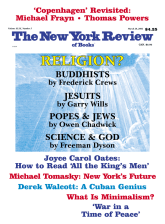To the Editors:
Stuart Hampshire, in his review of my biography of Iris Murdoch, Iris Murdoch: A Life [NYR, November 15, 2001], draws an elegant and memorable picture of Murdoch—of her joy in living and in writing, of her quarrel with British philosophers, of her defense of the inner life. It is surely odd, however, to present her as an unalloyed pagan and hedonist, and to underplay the puritan, Good-haunted seeker present everywhere in her fiction and philosophy. If he is right that she was “completely unwounded,” why did she repeatedly act out the compulsive need to run love affairs concurrently? This did not, by other accounts, always render her happy.
Hampshire does not mention that he is himself one of the British philosophers with whom Murdoch quarreled. He is one of Murdoch’s leading polemical opponents (as well as the dedicatee) in her The Sovereignty of Good. She also attacked his Freedom of the Individual.* Crudely: she had a religious sensibility and he did not. There are aspects of her thinking which are consequently opaque to him, and these are shortchanged in his review.
She conceived of her life—as of all human life—as a pilgrimage. Iris Murdoch: A Life accordingly has a simple shape and three distinct parts—“Fairy-Tale Princess,” “Storm and Stress,” and “Wise Child,” honoring Murdoch’s religious sensibility: Innocence, Fall, Redemption.
Authors worry about how scrupulously their books have been read. Here Hampshire describes Murdoch as “half-Irish,” though her family had, on both sides, lived in Ireland for three hundred years. He twice implies that Murdoch was brought up in Dublin. She left Dublin as an infant. Since the Bulgarians who murdered her Oxford contemporary and friend Frank Thompson are named, it is bizarre to read Hampshire describe his “execution by the Germans.” I did not—as he claims—specify a “mathematical logician of Austrian origin” as her lover. Nor does my book name any of her friends, displaced by war, as natural followers of Simone Weil. She did not, lastly, leave behind “ninety-five” diaries, a theory advanced until now only by a gossip columnist in The Sunday Times. It is odd to see this repeated in the pages of The New York Review, valued by this reader for its habitual care.
Peter J. Conradi
Radnorshire, England
This Issue
March 28, 2002
-
*
See “The Darkness of Practical Reason,” in Iris Murdoch: Existentialists and Mystics, edited by Peter J. Conradi (1997), pp. 193–202.
↩



